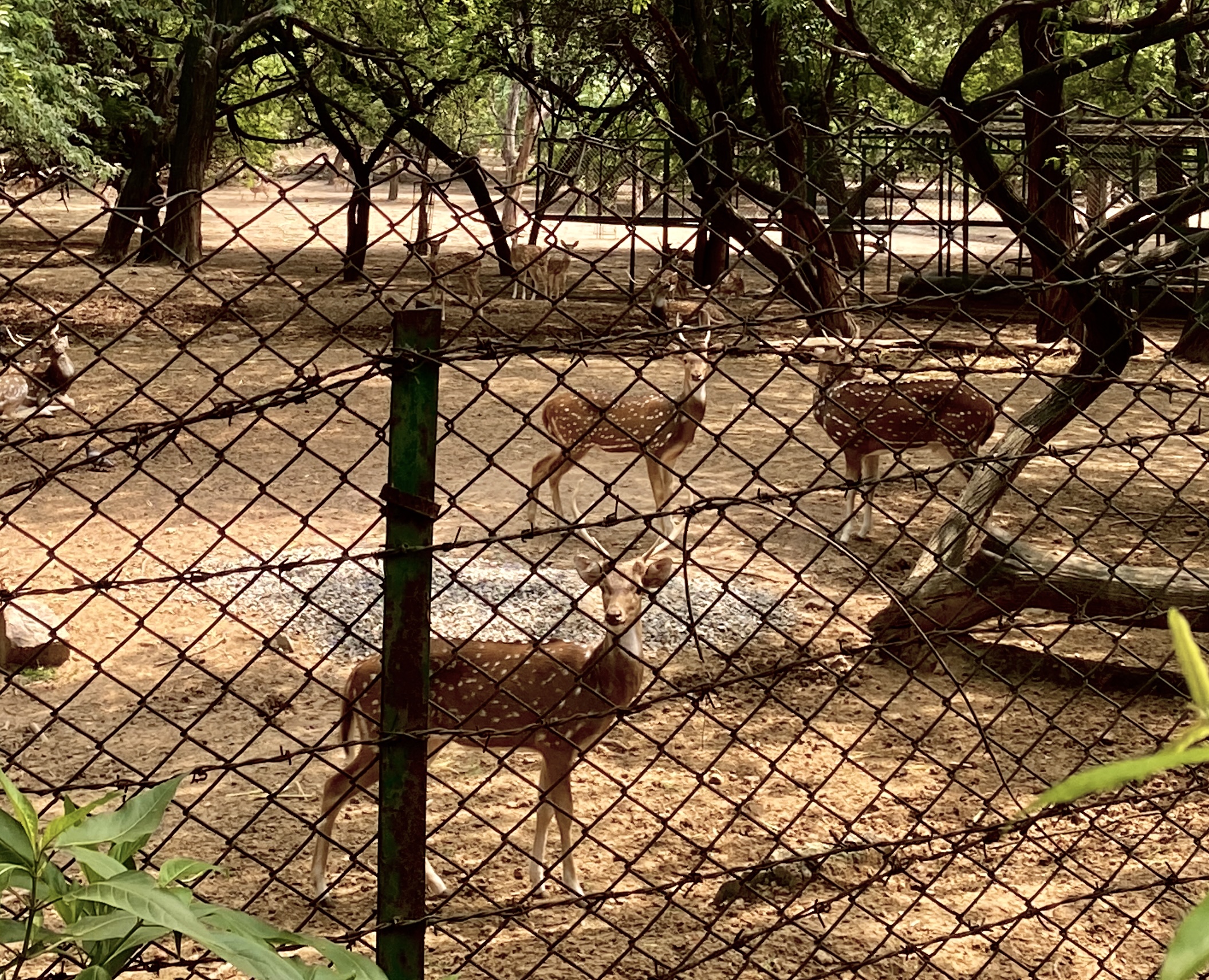
PROTECTED: Standing behind the fences
In A.N. Jha Deer Park, people of all ages and walks of life gather to spend quiet evenings and find solace from busy urban existence.
As they go about enjoying the evenings with children playfully running, lovers holding hands, and families chattering, there is one common sight that intrigues them equally: the presence of deer.
This fascinating sight has also given the park the tag of ‘mini zoo’.
However, things are changing and the park is going to lose the tag soon.
The Central Zoo Authority has recently approved a long-awaited decision, initially proposed in 2022, regarding the overcrowding of deer at the park. It lacks natural predators and currently houses more than 600 deer.
To address this concern, the authorities have decided to relocate the deer to two tiger reserves in Rajasthan, namely Mukundra and RamgarhVishdhari, along with Delhi’s Asola Bhatti Wildlife Sanctuary.
The move aims to establish a more balanced ecosystem by building up the prey base in these areas. 70% of the deer will be relocated to Rajasthan and 30% to Delhi’s Asola Bhatti. Although the date of the transferring of deer is not announced yet, the news of the park’s closure has stirred up a sense of puzzlement among regular visitors – filling the air with nostalgia and concern.
For over half a century, it had been a sanctuary for both humans and animals alike. Kamlesh Panchal, a regular visitor in her late 60s, says, “Ghar mein toh saans aati nahi, sawere deer park mein aagye toh thoda oxygen mil jaata hai ( Home becomes claustrophobic, only when I come to the park do I feel like I am breathing).”
The frenzy of the park is what excites Panchal and she affectionately remarks, “Ye poora din ka mela laga rehta hai (It’s like a fair every day).”
She also highlights that elders often come for walks, while school and college students are drawn to witness the deer, peacocks and rabbits, “Deer chale jaenge toh puri raunak hi chali jaegi (If the deers are gone, the place will lose its charm),” she says.
Even the younger generation felt the weight of hearing the deer’s transfer from the park. Arsh Dubey, a boy in his twenties, would spend most of his afternoon in the park.
“The main attraction of the park are the deer. When I was a kid, my parents would bring me here to show them. Without deer, the park would lose its unique appeal and would be reduced to a mere open space without its cherished inhabitants,” he said disappointedly.
From childhood visits with his parents to the skating rink and engaging in cricket matches, to later years spent playing football and taking full advantage of the gym facilities, the park held cherished memories of diverse fun experiences for Arsh and his friends as they grew up.
Vikas Adarsh, who recently came to Delhi from Bihar, finds solace in a warm and cosy corner of the Deer Park while sitting with his child. Despite being new to the city, Vikas has made a routine of visiting the park and has been coming here for the last five days.
“Deer Park naam se prasidh hai toh log deer hi dekhne aate hai (It is famous because of its name and this is why people visit here),” he says.
Adarsh expresses concerns, fearing that the deer may not receive the same space and care as provided by authorities in the park. He believes that the deer are well taken care of in the park’s nurturing environment. Netraprasad, a dog walker, has been a regular visitor to the park for the past decade. He points out how people throw food to the deer over the fences despite warnings.
The deer are enclosed in a netting and visitors are not allowed to feed them.
Netraprasad expresses concern that careless feeding might cause issues for deer, as the food being offered is not suitable for their diet. He also expresses his doubt regarding the transfer and says, “They are surviving with difficulty in Delhi’s heat, how will they survive in Rajasthan?”
Anil Kumar and wife Rani Kumar, residents of Arjun Nagar, have been regular visitors for several decades now. Anil, having grown up in the vicinity, has witnessed the transformation of the area from a forest to the beloved deer park that it is today.
The couple have a plethora of cherished memories attached to the park. It served as the backdrop for their early married life, where they created beautiful moments and took photographs with their children.
Even after growing old, they continued to visit the park for morning walks.
They are worried that the small shops that have bloomed outside the park may lose their business and the workers may lose their jobs if the deer are transferred.
“The tourists would cease coming to the park, resulting in the closure of small businesses operating nearby. The workers may also lose their jobs. If there is an overpopulation of deer, transfer some of them. At least, keep 10% of the deer to attract the tourists,” the couple said.
The decision to relocate the deer has raised concerns among regular visitors, who question the potential impact on the park’s appeal and the well-being of animals.
As the future of the park remains uncertain, the memories, nostalgia, and doubts of its visitors paint a picture of a place deeply intertwined with their everyday life.
Delhi hosted what organisers describe as the world’s first player auction in golf, launching ‘72…
An elderly woman recalls how her six-year-old granddaughter lay bleeding after a speeding car hit…
Municipal Corporation of Delhi plans a unified policy enabling RWAs to adopt and maintain parks…
A 17-year-old boy allegedly died by suicide after jumping before a moving train at Uttam…
Delhi High Court grants bail to 26-year-old Thar driver accused of mowing down two in…
Two Rohini men arrested for fatally stabbing one person and injuring another during a robbery…